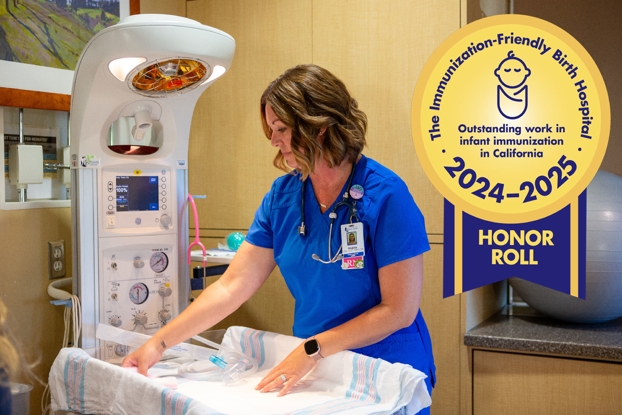Importance of Newborn Screenings
- Category: Health & Wellness, Birthing
- Posted On:
- Written By: Lompoc Valley Medical Center

When a baby is born at Lompoc Valley Medical Center ("LVMC"), there are several newborn screenings completed before discharge. Babies complete a hearing screen, a congenital cardiac disease screen, and a newborn screen, all prior to discharge.
The newborn screen is a blood test that detects rare disorders that can lead to serious health complications (including brain damage and death) if the disorder is not treated early. Babies with one of these disorders can appear healthy at birth. Finding these disorders early through the screening program allows for treatment before symptoms develop. In some cases, symptoms are apparent only after the damage has been done; therefore, screening is critical for these children and families.
When your baby is born at LVMC, the test will be collected (most commonly in the room) by obtaining a few drops of blood from the baby’s heel. The blood is collected in a special filter paper. The test is safe.
The newborn screen test in California tests for 58 disorders. Examples of categories and specific disorders: endocrine disorders such as primary congenital hypothyroidism, metabolic disorders such as PKU, blood disorders such as sickle cell, cystic fibrosis, and immune system disorders such as severe combined immunodeficiency.
When the baby is sent home from the hospital, parents receive a pink copy of the Newborn Screen form with their contact information. Parents are asked to check the contact information -- if further testing is advised for the baby, this information will be crucial. Parents are advised to take the pink copy of the newborn screening form to the baby’s first check-up. This will help the doctor find the baby’s results. It takes about two weeks for the doctor to receive the written results, but a positive screen will be acted on immediately. Parents will get a letter and possibly a phone call, as will the physician. Parents who change addresses soon after their baby is born should make sure the baby’s doctor or the clinical staff has their new address and phone number.
Another screen completed when a baby is born at LVMC is a type of newborn screening to detect congenital cardiac disease or CHD. CHD is the most common of birth defects, affecting 1 in 100 births, that can be detected through a pulse oximeter test. Pulse oximetry is a non-invasive test that measures how much oxygen is in the blood. Infants with heart problems may have low blood oxygen levels and therefore the pulse ox test can help identify babies that may have CHD. The test is done using a machine called a pulse oximeter, using a painless sensor placed on the baby’s skin. The pulse ox test only takes a couple of minutes and is performed after the baby is 24 hours old and before he or she leaves the newborn nursery.
LVMC participates in the Universal Hearing Screen program. Hearing screening programs are called “universal” because they are set up to test all babies.
At LVMC, all babies can and should have their hearing tested before they leave the hospital. Simple tests can be used to check a baby’s hearing right after birth. We don’t have to wait until children are older to check for hearing loss. Newborn hearing tests are important because a lot of effective help is available when hearing loss is found early in a baby’s life. When a baby fails the screening tests, he or she is referred for more detailed, diagnostic hearing testing.
If a hearing loss is found, then hearing aids and therapy services are started to help the baby learn to listen and speak.
In September, LVMC recognizes Newborn Screening Awareness Month. Newborn screening programs in the U.S. began with the work of Dr. Robert Guthrie, who in the 1960s developed a screening test for phenylketonuria, according to the National Newborn Screening and Genetics Resource Center (NNSGRC). When Dr. Guthrie also introduced a system for the collection and transportation of blood samples on filter paper, cost-effective wide-scale genetic screening became possible.
Newborn screening is recognized internationally as an essential, preventive public health program for early identification of disorders in newborns that can affect their long-term health. Early detection, diagnosis, and treatment of certain genetic, metabolic, or infectious congenital disorders can lead to significant reductions of death, disease, and associated disabilities.






